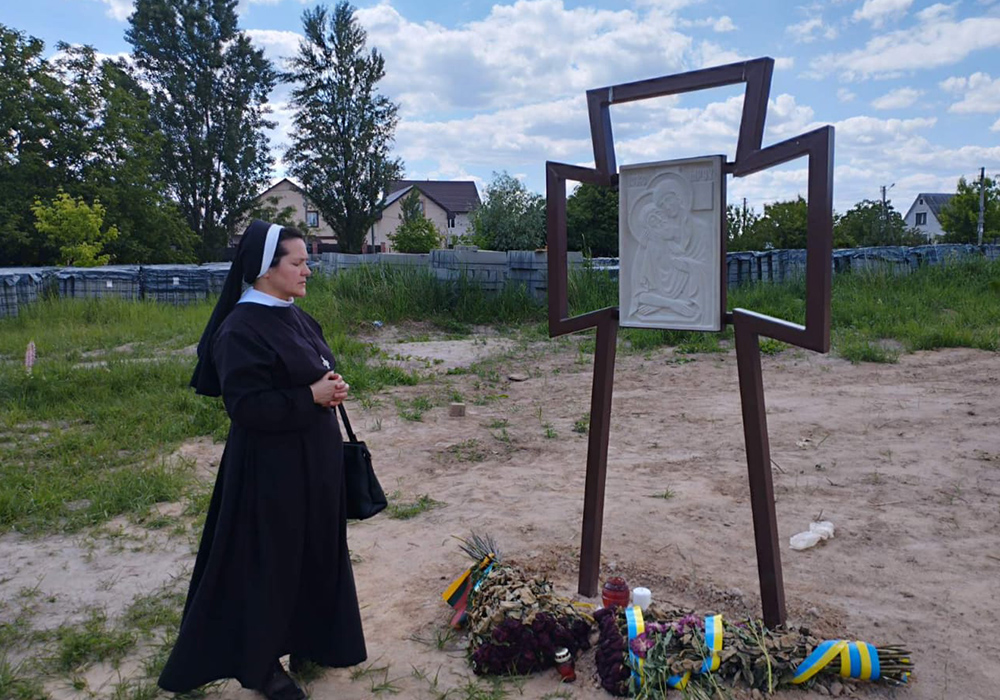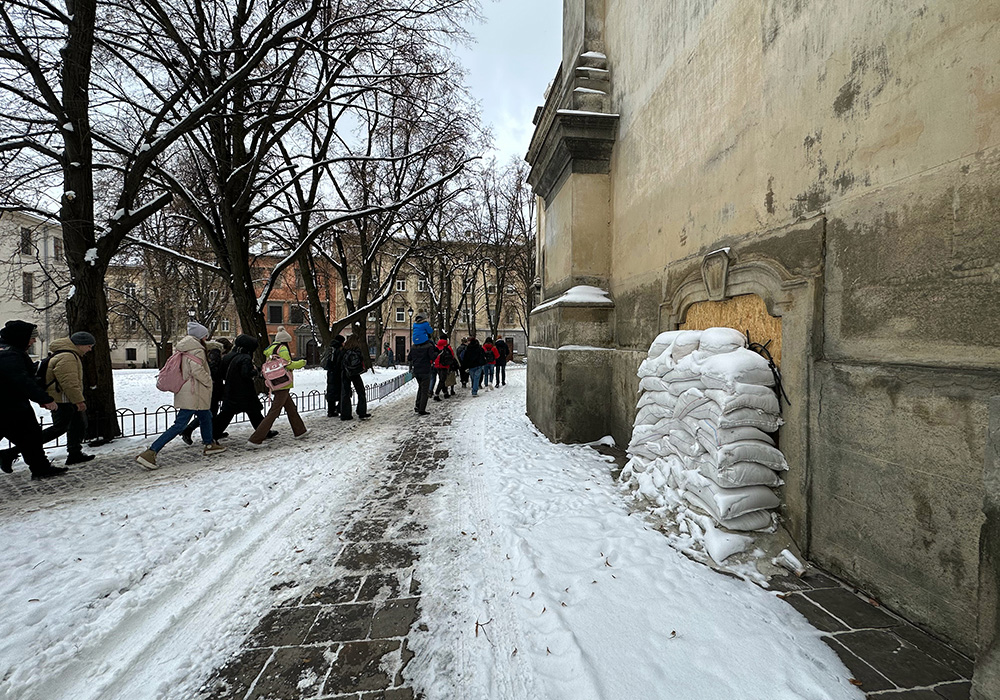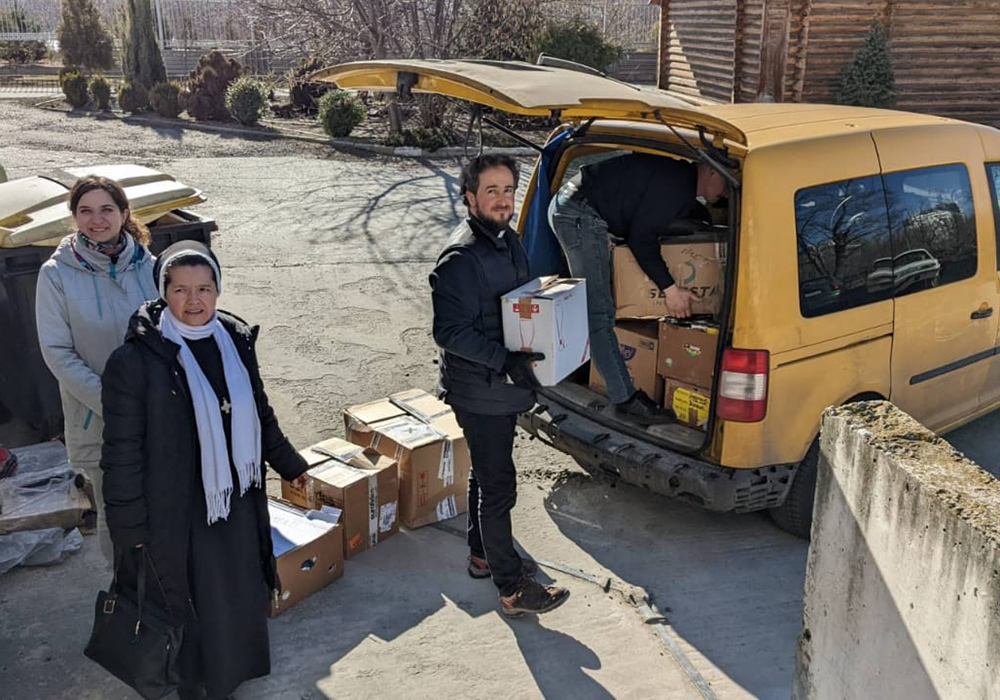Sr. Lydia Timkova of the Dominican Sisters of Blessed Imelda teaches a catechism class in Mukachevo, Ukraine, in February. Her students include new arrivals from other parts of Ukraine displaced during the war. The Dominican sisters are originally from neighboring Slovakia but have long experience in Mukachevo. Since the war's beginning, Timkova has traveled to eastern Ukraine at least three times to deliver humanitarian aid to areas hardest hit by the war. (Gregg Brekke)
Editor's note: Today, Global Sisters Report launches a new series, Hope Amid Turmoil: Sisters in Conflict Areas, which offers a look at the lives and ministries of women religious serving in dangerous places worldwide. The news stories, columns and Q&As in this series will include sisters in Ukraine, Nigeria, Kenya, Sri Lanka, Nicaragua and more throughout 2023.

On a February afternoon of welcome blue skies and bright sunlight, brothers Basil and Nicolai Knutarev surveyed the scorched apartment complexes in Irpin, Ukraine, where they once lived.
The apartments have remained untouched since a brutal three-week Russian siege and bombardment that ended March 28, 2022, more than a month following the start of Russia's Feb. 24 invasion of Ukraine. With their blackened, charred exteriors, the buildings evoke danger and menace, underscored by the distinct smell of leaking gas wafting in the cold air.
The siege resulted in nearly 300 civilian deaths, making Irpin, a once-tranquil community about 15 miles west of the capital of Kyiv, nearly as infamous as neighboring Bucha, the better-known site of alleged Russian war crimes.
Irpin's pre-war population of 70,000 dwindled after the siege. Most residents have since returned, though some, like the Knutarev brothers, remain displaced.
Nicolai, 76, a retired factory worker, now lives in a nearby town with other relatives but occasionally comes by Irpin to check on things, including picking up potatoes in a rented garage that serves as a temporary storage cooler.
Basil, who also relocated nearby, looked up at the hulk of his vacant apartment building and shrugged.
Basil Knutarev stands in front of his apartment building in Irpin, Ukraine, that was destroyed by Russian artillery in the early days of the invasion. All the residents had evacuated and nobody was injured in the shelling. (Gregg Brekke)
"We lost everything": It's a sentiment shared by millions of Ukrainians uprooted and displaced during a year of a war condemned by much of the world that has transformed the face of Europe, increased international tensions and caused ripples in the global economy.
Anti-tank barriers sit on the street corners near the Roman Catholic cathedral in Kyiv, Ukraine. (Gregg Brekke)
"Life has changed not just for Ukraine, but the whole world," said Sr. Yanuariya Isyk, a member of the Sisters of the Order of St. Basil the Great whose ministry is based in Kyiv. "We're living a new life now. It can't be the same as it was before the war. Life will never be the same again."
The new reality is one of displacement and confusion, loss and death. Hospitals, schools and neighborhoods have been targeted in particularly brutal acts that have outraged the world. The United Nations says more than 7,000 civilians, including more than 400 children, have died because of the war, and more than 11,700 have been injured.
Even in locales far from the front, life is always on edge, with blackouts and electrical outages — Russia has targeted the country's power grid — and air-raid sirens interrupting an afternoon idyll.
Yet Ukrainians also speak of renewed unity, solidarity and hope. In a country that has become one big conflict zone, the war has galvanized religious communities to open their doors to those who have been displaced and to lead various humanitarian missions.
"We've had to think less of ourselves and more about everybody else," Isyk said in an interview in the small apartment monastery she shares with two other sisters in a building damaged when Russian saboteurs engaged with Ukrainian forces early in the war.
Though her work in Christian education in Kyiv remains paramount, Isyk has coordinated deliveries of food — flour, pasta, canned fish and meat, rice, and milk — and medical supplies to those in need.
In May, Isyk and other volunteers visited Bucha to meet with residents and pray at the mass grave of slain civilians. It was a hazy, cloud-filled day, and residents were silent as Isyk and others unloaded the food and other supplies. Then the tears came as people recounted their experiences.
"They told us how they survived and were grateful they could speak to someone about that," she said. "It was important to hear their stories, to ease their pain and to comfort them."

Sr. Yanuariya Isyk pays her respects at a mass grave of civilian victims of alleged Russian war crimes in Bucha, Ukraine, during a May 2022 visit. (Courtesy of Yanuariya Isyk)
Such comfort is a needed balm. Catholic religious feel the promise of and hope for eventual victory, of resurrection, but that is still not visible.
"For us, 2022 was a year of deep darkness and crucifixion for the Ukrainian people," Isyk said. "Thousands of Ukrainian hearts were crucified, people's destinies were mutilated, cities and villages were destroyed."
There is no sign that the war will end soon. And earlier this month, people spoke of bracing for the worst, with many fearing a new Russian onslaught from the north, possibly from Belarus, a Russia ally.
"Right now, things are stable, but everything is still on the table," Dominican Fr. Mikhailo Romaniv said of the situation in Fastiv, a community of 45,000 about 45 miles southwest of Kyiv. Romaniv is in charge of the Christian Center of St. Martin de Porres, a Dominican ministry that provides assistance to mothers and children with various needs in addition to those who have been displaced or are experiencing homelessness.

Sandbags protect the basement of the Greek Catholic cathedral in Lviv, Ukraine, that serves as a bomb shelter for local residents. (Gregg Brekke)
Whatever stability Fastiv has is welcome to Dasha Habovska, 24, and her 1-year-old son, Christian, who are living in a converted hospital on the city's outskirts as part of the Dominican ministry. In early February, the residence housed seven families — 18 people in all.
Habovska and her son fled the then-occupied city of Kherson in September, leaving behind Habovska's partner and Christian's father, Daniel, who is now serving in defense work along the Ukraine-Belarus border.
In some ways, the decision to leave was easy because the family's home was near an area of bombardment. But the separation has been difficult.
"It's hard for Christian, being away from his father," Habovska said, adding it is challenging to raise an infant alone in a new environment. But Habovska said she feels safe and is grateful for the assistance, care and housing she and her son receive.
"They are providing so much help, and help that you cannot find on any corner," she said.
Still, there are the constant worries — about family back in Kherson, about Daniel, about the course of the war.
Like nearly all Ukrainians, Habovska is confident of the war's ultimate outcome — "Of course, we will win," she said — but she can't be sure how the war's next phase will turn.
"We're prepared for everything," she said. "It's so disturbing."
Dasha Habovska and her son, Christian, now live in Fastiv, Ukraine, after the Russian invasion and bombardment their home in Kherson. (Gregg Brekke)
And yet even amid such uncertainty, ministries continue.
Sr. Damiana Monica Miac, a Polish sister and one of five Dominican Sisters of Jesus and Mary who live and work in Fastiv, said a kind of routine has returned to the life of the school where she teaches kindergarten.
Miac, 53, has lived in Ukraine for 30 years, 24 of them in Fastiv. She recalls the early months of the war, with Russian troops nearby, as nerve-racking and trying. There was little food, and life felt like it was under siege.
"It was a hard time for everyone," she said. "At first, I couldn't pray at all."
She eventually found solace and strength in her community and her teaching. There are 35 kindergarten students at her school now, about half of them from permanent Fastiv residents and the rest from displaced families.
And Miac's prayer life eventually returned and even deepened.
"The rosary," she said. "That helped."
Miac has come to trust further in God and said she thinks Ukraine will ultimately prevail.
"I believe everything will be all right," she said.
Even amid such optimism and signs of reconstruction in damaged areas like Bucha, the hurdles ahead are enormous, with the need for physical, cultural and spiritual repair.
"Ukraine has been damaged, and that is reflected in so many ways — schools destroyed, our heritage harmed," Isyk said. "It will take many years to rebuild and heal this society."
Those who have been displaced "have a wish to return home this spring," said Edith Dominika Shabej, a Hungarian Dominican associate and coordinator with Caritas who works with Dominican sisters in western Ukraine and eastern Slovakia. "But the problem is their homes have been destroyed. They have no place to return to."
In many parts of Ukraine, she said, land mines left by Russian forces also pose a deadly threat.
As the human toll of the war climbs — with estimates of military casualties on both sides in the hundreds of thousands — Ukrainian military families need help and solace, as do returning war veterans.
Another problem: the rise in alcohol abuse as families separate, particularly as women have migrated to other countries and men who have not been conscripted try to find meaning in their lives.
Advertisement
"They don't know what to do," Romaniv said of the men now living on their own. "They drink. And without the women with them, they lose the motivation to work."
Yet despite the extent of societal damage, the religious are adamant that Ukraine should not compromise with Russia to end the war.
"That would be a compromise with evil," said Dominican Fr. Petro Balog, who heads the Institute of Religious Sciences of St. Thomas Aquinas in Kyiv. "It's not Christian to compromise with evil."
Balog said Ukraine's Calvary began with the February 2014 annexation of Crimea and the war in the Donbas region that began a few months later.
For Ukrainians, he said, resurrection will be marked "when death is defeated, and the threat of death will linger as long as Putin's imperial and [Soviet-like] Russia exists."
"Our task is not an agreement with death, not a compromise," Balog said, "but to overcome it, and that is final. I think with God's help, it is possible."
In Lviv, where the signs of war are less visible than they are in the towns around Kyiv, that sense of commitment is no less deeply felt.
"The thing people don't understand is that Putin and Russia will not give us a real peace," Andrusiv said. "If they give us two years, they will come back and kill. That will not be a real peace. ... We know there are good people in Russia who want peace. But they aren't in the majority."
Ukraine is fighting a battle against tyranny in a war that has implications far beyond the borders of Ukraine, Andrusiv said. "Our people are dying to protect the world."
As Isyk walked through her apartment building, she pointed out a partially shattered stairwell window with a still-visible bullet hole. She said she could forgive Russia — "maybe not now, but in the future, yes. But the war will have to end, the suffering will have to end. We're waiting for them to admit this mistake, and only then will we forgive them."
She said the country needs to remain steadfast.
"There will be a victory of life over death, good over evil, a celebration of victory over death, a celebration of hope and salvation, a celebration of good news after the dark night," Isyk said.
"By God's grace, Ukraine will be resurrected."






